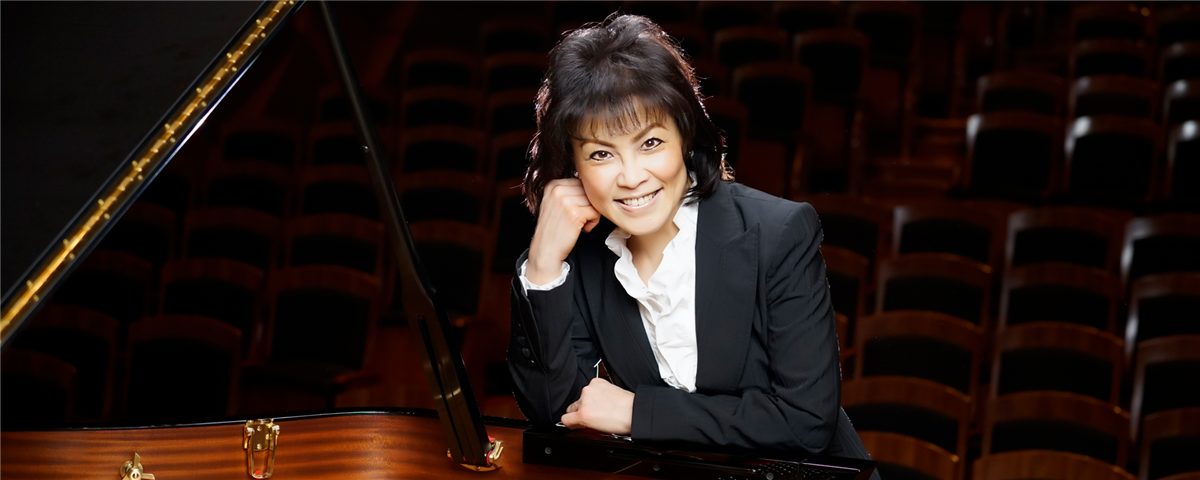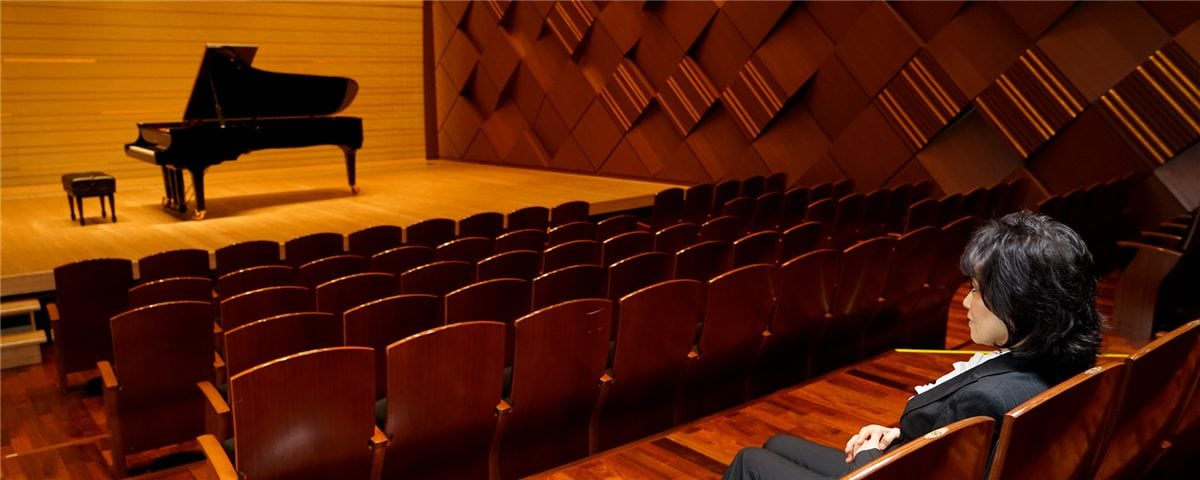Interview with Noriko Ogawa
An ever-curious, piano-loving child who overcame many challenges on the road to becoming a professional pianist
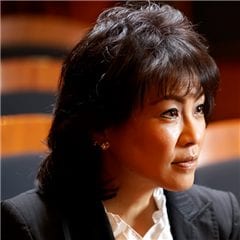
Noriko Ogawa’s mother is a piano teacher, and from a very early age, Noriko loved the instrument.
“My first performance was when I was only two and a half years old. At one of my mother’s class concerts, I apparently declared “Me play too!” and insisted on playing some tune or other that I had learned by ear. When I was four and a half, I started taking proper lessons at Fumiko Kuroda’s class. Naturally, she had me just play simple notes to start, and I remember innocently wondering why, because I thought I could play so many other pieces already. My finger work was terrible, and I made up my own rules. Ms. Kuroda taught me the importance of beautiful form in my hands while playing, and for that, I am very grateful. She was pretty strict, week after week drawing diagrams on my sheet music to help me and holding my fingers to keep my hands arched.”
When she was six years old, Noriko began attending the Toho Gakuen Music School Precollege, where she received expert tutoring. A lively little girl, she was interested in many things other than music and was also well able to express herself at school.
“I loved to talk down the boys at our school meetings!!! As a kid, many different things interested me, and my mother had a hard time keeping up as my attention shifted from one new thing to another. I was actually talking with a friend in the UK about this recently and wondered out loud how different my life would be if I’d taken a different path back then. My friend jumped in immediately and said that piano was the only choice for me and I should be grateful that I was helped to develop my talent. He’s probably right (laughs).”
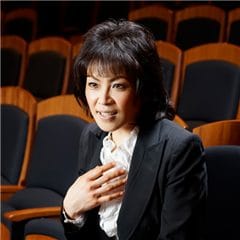
At the age of 11, Noriko won first prize for elementary school students in the Student Music Competition of Japan, later going on to win the corresponding prize for high school students in her first year of high school. While this would suggest that her first steps on the journey to becoming a professional pianist were smooth sailing, her school days were actually full of worry and frustration.
“Although I had some wonderful teachers, I was rather unfortunate in that they all had to stop teaching me because of ill health. When I first entered the Toho Gakuen Music School Precolllege, I couldn’t wait for my Saturday lessons in solfeggio, music dictation, and choral singing, and with my piano playing really improving under the tuition of Katsuyo Suemitsu, my days were busy and rewarding. However, Ms. Suemitsu became seriously ill, and looking back now, that was the start of fifteen difficult years of irregular lessons. “I became a student of Aiko Iguchi when I was 10, and I made a lot of progress under her strict yet passionate teaching. The following year, I was awarded first prize for elementary school students in the Student Music Cmpetition of Japan, but quite soon afterwards, Ms. Iguchi also became very sick, and I was introduced to a new teacher, Takashi Hironaka. The fact that he had a big career as a professional pianist made his lessons new and exciting, and I learned much from him. However, his performance schedule meant that lessons were never on a regular schedule, and I had to work out how to practice for myself. Although I won the Student Music Competition of Japan for high school students, I felt under a lot of pressure, and with no regular teacher, I was really worried about my future. “Upon graduating high school, as a way to resolve this situation, I went overseas against the objections of many of those around me to study at the Juilliard School in New York. There, I began studying with Professor Sascha Gorodnitzki, but after just two lessons, he became ill and couldn’t continue. For the next four years, until I graduated from the Juilliard, I was pretty much my own piano tutor, and I must admit that I was jealous of other students who had a good relationship with their teachers. I often dreamed about how much I too would benefit from a bond of mutual trust with a tutor.”
Noriko’s luck changed for the better when she met Benjamin Kaplan.
“I had a lesson with Benjamin Kaplan when he visited New York from London, and in an instant, I knew that I had finally found what I was looking for. I could at last see the light at the end of a long tunnel. So, once I had graduated from the Juilliard School, I moved to London to play to Benjamin, and thanks to the wealth of knowledge and experience packed into his lessons, I won third prize at the Leeds International Piano Competition. My career as a professional pianist began right there, and the subsequent three decades have given me so many wonderful memories.”
Enthusiastically active in many spheres all over the world
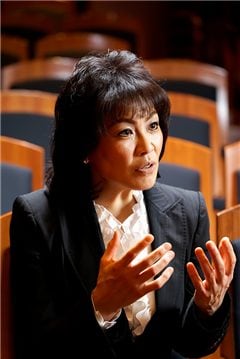
Nowadays, Noriko travels back and forth between Japan and the UK at least once a month, and if we consider the other countries also visited, the past three decades have seen her jetlagged more than thirty times a year. In fact, she had just returned from London the night before our interview.
“After performing a recital in Barnard Castle in the north of England, I took an overnight coach back to London, went straight to the airport, and then travelled to Narita Airport with a stop-off in Helsinki. This is pretty normal for me. Last month, I gave a seminar and a recital at Banff Centre for Arts and Creativity, which is in magnificent Canada’s Rocky Mountains. From composers of electronic music and singer songwriters to percussionists and even a player of a recorder as big as a chair, a wide range of young and experienced musicians involved in unique professional activities showed up to perform for each other and talk. The experience was very thought-provoking for me also. Against the backdrop of a breathtaking snowy landscape at -25°C, it was a wonderful opportunity to focus solely on music.”
Noriko is enthusiastic in her participation in outreach activities, such as Jamie’s Concerts for families of children with autism.
“Having lived for two years in London with the family of Jamie Cameron, a young man with severe autism, I began to wonder if there wasn’t something I could do to help. This led me to set up Jamie’s Concerts so that the families of children with disabilities could take time out from their busy schedules and enjoy music. Thanks to the great support we have received, we have now been holding 15 concerts for the last 13 years, and it looks like 2017 is going to be a big year. At each concert, we hand out questionnaires and then submit the results to academic researchers in the UK. Quantitative results have now shown the significance of our concerts, and these research findings will be released at the Guildhall on June 12th. The National Autistic Society of the UK has also started to pay close attention to the benefits of music, and this in turn has led to an expansion of our activities.”
Noriko combines her musical activities with a passion for education.
“My personal history had me believing that pianists with busy performing schedules should not teach, but I then began to think about the young musicians who could benefit from my experience and knowledge. I have now taken on some students at the Guildhall School of Music and Drama in London where I am also responsible for a project to teach piano duo techniques to graduate students. At Tokyo College of Music, meanwhile, I teach students who want lessons, but as a specially-appointed professor, I’m hoping to have more classes focusing on competition from this academic year. In particular, I am hoping to help students understand that their performance begins the second they step out onto the stage. Recently, there has been a trend among young people in Japan to avoid standing out and attracting attention, but if that is really their attitude, then they shouldn’t be entering competitions. Hopefully, I can work with students to help them understand how best to convey their unique personalities to the audience through music. I get terribly excited once I start teaching, so much so that my students are often amused. But that’s just because teaching them about the emotion and nuance of music is the only thing on my mind.”
Noriko is strongly motivated to bestow the next generation of pianists with the knowledge and understanding that she gained with great difficulty by figuring things out along the way.
“How I perform and teach has been affected to a large degree by Takashi Hironaka and Benjamin Kaplan. Neither of these teachers played much during our lessons deliberately. Mr. Hironaka said I would just copy him... Now that I find myself in the teacher’s shoes, I have to agree: students can imitate their teachers’ playing in the studio, but as soon as they step out the door, they forget. I remember my own experience and how I struggled out of necessity to teach myself, and it’s clear to me that we cherish most the things that do not come easily. “Our mission is to read and understand the map of the piece, to interpret the feelings that the composer infused in the notes, and to convey that to the listening audience as a story. I always try to have my students understand this.”
Chairperson of the Hamamatsu International Piano Competition jury, with a Yamaha Hall recital coming up on July 7th
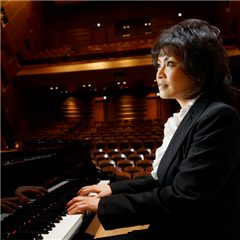
The tenth Hamamatsu International Piano Competition will be held in November 2018, and Noriko has been announced as chairperson of the jury.
“As the chairperson of the jury, my hope for the Hamamatsu International Piano Competition is that it will launch the careers of great many professional pianists. The competition has already given us a lot of amazing musicians, including winners of the Chopin Competition and the Tchaikowsky Competition to name a few. However, I want young pianists to realize that, even if they don’t enter any other competitions, Hamamatsu can be a gateway to the rest of the world. In addition, I want the jury to be able to launch these fledgling careers with confidence. To that end, I am now working hard to arrange as many concerts as possible for the winners.”
We ask about the significance of competition to today’s young pianists.
“Competitions have winners and losers, and this really focuses the contestants’ minds on preparing well. They practice with great determination and commitment to make no mistakes whatsoever, and this clearly helps to improve their practical skills. Once in a while, a young pianist having had his or her talent recognized at an early age will go out there without having gone through the competition route. Such cases are, however, extremely rare. For the majority of young pianists, competition provides the best chance to break out onto the global stage. Regardless of their nationality or whether or not they are well connected, the contestants all participate as equals. From that perspective, I would like as many young musicians as possible to enter the Hamamatsu International Piano Competition. “Recent years have seen competitions all over the world prune applicants through strict DVD evaluations, and the next Van Cliburn and Leeds, for example, will have only 24 participants. In contrast, 100 contestants can enter the Hamamatsu International Piano Competition. From many different perspectives—particularly the range of practice facilities available—our setup is ideal for competition. Local volunteers are also very welcoming, providing homestay accommodation to contestants who do not make it past the preliminary stages and arranging many concerts and events in the city of Hamamatsu. “The predilection of jury members will always be reflected to some degree in the judging at any competition, and contestants often do not get the results they think they deserve. Even if that were to happen, I hope that our contestants can still take away something from the Hamamatsu. On the other hand, just because someone wins, it doesn’t mean that he or she can let up. Winners will be representatives of the Hamamatsu International Piano Competition as they travel around the world, so they are expected to maintain a high standard of performance. As chairperson of the jury, it is my responsibility to explain clearly and firmly to the winners that their real life as a musician begins there and then.”
We ask if there will be anything different in the 10th competition.
“The official announcement will be made in June, but I don’t expect there to be any major changes. Some other competitions have significantly expanded their repertoire over the past few years, but I think our competition has just the right number of pieces. “Since the eight Hamamatsu competition, the third round has included Mozart chamber music, and I hope that stays the same for the 10th. The two piano quartets in the repertoire are the only ones that Mozart composed, but I would like to see them become part of the tradition of our competition. Even if one has been practicing for many years, Mozart’s chamber music is never easy!!! Many young pianists do justice to Rachmaninoff without much effort, but very few can faithfully play Mozart with all its subtle delicacies. What’s more, we are talking about chamber music, so the contestants have to interact tactfully with string musicians. These pieces will really be the litmus test of their abilities as pianists, so having Mozart chamber music in the third round is an important part of the overall judging process. “I expect very little will change with regard to works commissioned from Japanese composers for the second round. I actually played one of the pieces from the previous competition at Jamie’s Concert and others. Starting with the 10th competition, I would like to see contestants in all rounds able to select works from Japanese composers. There are many wonderful pieces out there, so wouldn’t it be great to see Japanese names join Debussy, Chopin, and the like in the repertoire? “Although we are still discussing the actual details of the competition, studies removed last time will probably make a comeback. This is at the behest of audiences, and after all, competitions also need to be entertaining. I think that a battle of technical expertise in the first round would be great.”
The Yamaha Hall, where we are interviewing Noriko, brings back many memories from her childhood, and her first concert in the newly renovated hall will be held on July 7th.
“The Toho Gakuen Music School Precollege held its practical exams here at the Yamaha Hall, so starting around the age of 8, I came here several times a year to play. This is also where the Student Music Competition of Japan took place, so for my generation of pianists, the Yamaha Hall is probably remembered as somewhere they were really put through their paces. When I arrived here today, I was surprised to see how beautifully it has been renovated. The dressing rooms are also completely different now. Before, they were immediately behind the stage, so when we would go back after performing in the competition, the next kids up would come and ask how it was, if the keys felt heavy or sluggish, and so on. It’s very nostalgic to think about that now. “I won first prize in that competition, so this is pretty much the birthplace of my career as a pianist. To honor that memory, I added the Mozart piece that I played in the primary school competition (Piano Sonata No.3 in B-flat major, K.281) and Liszt’s La campanella, which I played in the high-school competition, to the programme. The Mozart sonata in particular is very well suited to the clarity of the Yamaha CFX, but the piano is also great for pieces requiring a powerful sound, like the Brahms and Schumann that I will play in the second half. Schumann’s Fantasie, which I will perform last, is a piece I actually played for Benjamin Kaplan in my first lesson after arriving in London. I hope that when I take the stage I not only reflect on my life so far as a pianist, but can also embrace it as the first step on a new journey.”
We look forward to hearing much more from Noriko Ogawa as she continues her journey on the world’s stage.

